
A group of veterans and their allies have entered their third week of a “Fast for Gaza” outside the United Nations headquarters in New York City. The group is calling for an end to arms sales to Israel and of Israel’s blockade of the Gaza Strip. We hear from multiple hunger strikers on their decisions to join the planned 40-day action and why they are pressuring the U.N. in particular. “We wake up each morning, and we don’t worry about whether or not our children have been buried under rubble overnight. We’re not drinking poisoned water. We’re not surrounded by rubble. We’re not dealing with the horrible traumas that people in Palestine and Gaza are dealing with,” says peace activist Kathy Kelly, who started her hunger strike two weeks ago. “What would make us stop? Well, certainly, if there were a permanent, unconditional, immediate ceasefire.”
Transcript
AMY GOODMAN: This is Democracy Now!, democracynow.org, The War and Peace Report. I’m Amy Goodman, with Nermeen Shaikh.
NERMEEN SHAIKH: At the United Nations, the United States vetoed another Security Council resolution calling for an immediate, unconditional and permanent ceasefire in Gaza. The final vote was 14 to 1. This is Dorothy Shea, acting U.S. ambassador to the United Nations.
DOROTHY SHEA: The United States has taken the very clear position since this conflict began, that Israel has a right to defend itself, which includes defeating Hamas and ensuring they are never again in a position to threaten Israel. In this regard, any product that undermines our close ally Israel’s security is a nonstarter. This resolution would undermine diplomatic efforts to reach a ceasefire that reflects the realities on the ground, and emboldens Hamas.
NERMEEN SHAIKH: Meanwhile, Palestinian U.N. Ambassador Riyad Mansour criticized the U.S. vote. This was his response.
RIYAD MANSOUR: One would have hoped that these minimal demands, that are dictated by humanity, by legality, by morality, would have received unanimous support. But, unfortunately, they were faced with a veto.
AMY GOODMAN: The U.S. veto comes as a group of veterans and their allies have entered their third week of a “Fast for Gaza” outside the U.N. This is Lieutenant Joy Metzler, an active-duty second lieutenant in the U.S. Air Force who’s applied for conscientious objector status.
LT. JOY METZLER: The blatant violation of international law, that the U.S. — and breaking its own laws. And I joined the military because I wanted to uphold justice, I wanted to protect our country, I wanted to protect people. And really, what the genocide in Gaza opened my eyes to is that the U.S. military — or, the U.S. military and U.S. government are just not interested at all in either of those things. And so, all of that came together, and I said I can’t be in the military anymore. This isn’t what I had been brought up to believe it is. The U.S. has been a destabilizing force for years now. And so, I am doing exactly what I’ve been taught to do, which is stand up for justice. But now I see that standing up for justice means being on this side, with all of these people out here in this fast, who are really fighting, actually fighting for people in the Middle East and in Gaza to be able to lead lives with dignity.
AMY GOODMAN: Joy Metzler was approved for conscientious objector status in April.
NERMEEN SHAIKH: And this is one of the Fast for Gaza organizers, Mike Ferner. He’s the former president of Veterans for Peace.
MIKE FERNER: I was a Navy corpsman during the American War in Vietnam, where we killed over 2 million people. I worked in a Navy hospital and tried to put together the bits of humanity that came back from Vietnam. So I’ve seen what happens to people in war. And it has never left me. It can’t leave me. And so, Iraq, Afghanistan, Palestine, these things happen, and, I mean, it just tears me up — and not just me, but many, many people all over the world, particularly Veterans for Peace members, who have seen what war does. And you can’t get that out of your mind. And when you see the hourly feeds from Palestine that we’ve been getting, just you can’t take it. I mean, I can understand completely why Aaron Bushnell did what he did. Not many of us have that much courage. But we want to do as much as we can to stop this. So, that’s why we’re doing this fast.
AMY GOODMAN: For more, we’re joined in our New York studio by another hunger striker. Kathy Kelly is board president of World Beyond War, longtime peace activist, pacifist, author, who’s been arrested more than 60 times, has been nominated for the Nobel Peace Prize a number of times.
Welcome back to Democracy Now!, Kelly — Kathy Kelly. How are you feeling? You’re in the third week of your hunger fast. Talk about why you’re usually outside the U.N. hunger-striking.
KATHY KELLY: Well, thank you, Amy and Nermeen.
Yes, third week, but, you know, we wake up each morning, and we don’t worry about whether or not our children have been buried under rubble overnight. We’re not drinking poisoned water. We’re not surrounded by rubble. We’re not dealing with the horrible traumas that people in Palestine and Gaza are dealing with. And so, we want to take what action we can to encourage, to focus world attention, because the leaders of the world now have an opportunity — it’s really an unusual opportunity — to press forward beyond yesterday’s very, very unfortunate vote, the fifth time the United States has vetoed a Security Council resolution.
There is a mechanism called Uniting for Peace, which would allow the General Assembly to bypass a U.S. veto. And the member staffs of the United Nations General Assembly permanent missions understand this mechanism. They really are working hard. But if we all push, as has been happening — we really do see it, don’t we, all around the world? I mean, in Ireland, Trinity College, they just severed, because of the student pressure, trade relations with companies and universities in Israel. But what the member states of the United Nations could do now is enact this Uniting for Peace resolution, and not just make denunciations, but give it teeth, really implement what has been implemented in the past. I mean, in 1956, the United States worked with the Soviet Union to implement this resolution, because they didn’t want France and the U.K. to invade the Suez Canal area. They wanted to have control. So it is doable.
The other thing is that the nations of the world ought to recognize that Israel is flaunting international law in so many ways. I mean, possession of nuclear weapons flaunts international law, and Israel has at least 90 thermonuclear weapons stockpiled. And the European Union is now investigating the other horrendous violations of human rights that have been happening.
And upcoming is the plan for a two-state solution conference hosted by France and Saudi Arabia. France hasn’t even recognized the statehood of Palestine yet. And we’re familiar with Saudi Arabia as a predator nation, as one that has been pretty greedy and avaricious in the way that it has taken from the Yemenis and imposed drastic, drastic warfare. So, what is going to happen? Is it possible that they’re going to try to use the United Nations to sort of give a good cover to what might become a collection of bantustan-like states that would not recognize the Palestinian right to self-return, Palestinian right to self-determination, Palestinian right to survival at this point?
NERMEEN SHAIKH: Well, Kathy, of course, as you mentioned, the U.S. vetoed this resolution. They’ve done so multiple times. What are you calling for now? How long do you intend to continue your hunger strike?
KATHY KELLY: Well, thank you. We’re out there for 40 days, so we’re just really at the beginning part. We want that Uniting for Peace resolution to be invoked. And it is a mechanism that’s possible. We also think that there are plenty of ways that they could give more teeth through using economic trade measures being canceled. The European Union is investigating that, but they can move faster and more firmly, so that we give teeth to the denunciations that have been given. And, of course, there’s much more allies. The United States is quite isolated. And perhaps within Israel, Israeli people longing for the release of the hostages will start to listen to some of their own reservists who are saying, no, Prime Minister Netanyahu is sabotaging the hostage release and ceasefire possibilities, and they won’t go to Gaza. There are 20 waiting to be sentenced, most likely.
AMY GOODMAN: How many of you are fasting? And what would lead you to end your fast?
KATHY KELLY: Seven hundred and fifty worldwide. We’re on the corner of First Avenue and 45th Street, and right now we are usually about 12 people that are core fasters here in New York. But there are others, in Australia, in — we’re hearing from people in China, Ireland, Canada, Mexico. So, this is a fast that grew very, very quickly. Phil Tottenham, you know, as Mike said, concerned about the life-risking options, he didn’t want to do what Aaron Bushnell did, because he said, “Well, I was afraid to do that, but,” he said, “I can fast.” And so, that’s really what got this going.
What would make us stop? Well, certainly, if there were a permanent, unconditional, immediate ceasefire, and all distribution of aid was being facilitated by the United Nations, which knows how to do it, and the Gaza Human Foundation would not be any longer relied on. They’re luring people into food distribution centers and then shooting them in the head, in the torso. And so, we want to see the full distribution of food and a complete end to any United States weapon shipments to Israel.
AMY GOODMAN: Kathy Kelly, we wish you the very best.
KATHY KELLY: Thank you, Amy.
AMY GOODMAN: Kathy Kelly is board president of World Beyond War, has just entered her third week on a hunger strike.

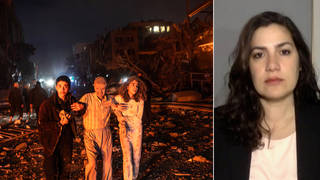
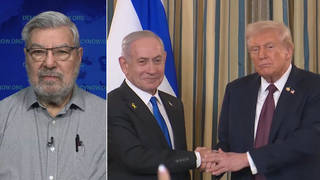
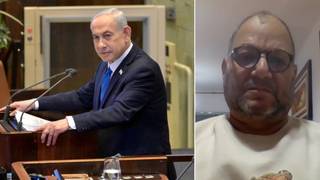
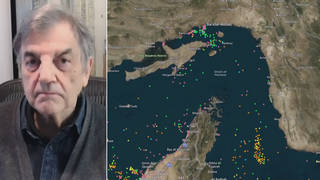
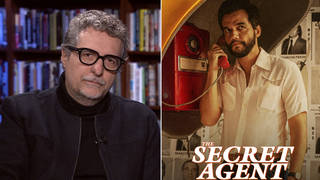
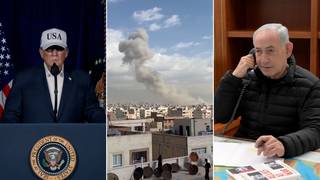



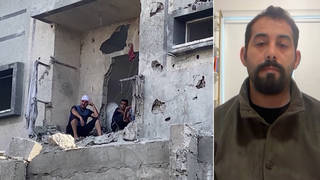
Media Options